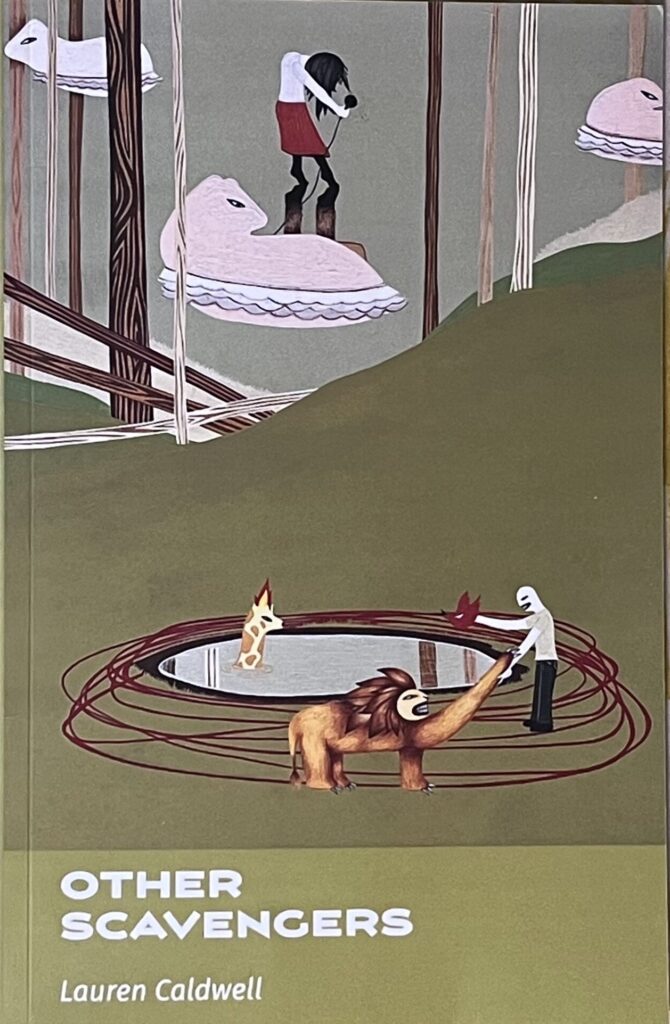
Lauren Caldwell ’24’s debut poetry publication titled “Other Scavengers” features 43 evocative, nostalgic and eclectic poems. Typically called a chapbook, this small collection of poetry is organized around a central theme. Much of Caldwell’s poetry focuses on her experiences of living in San Francisco’s outer Richmond district, where she was born and raised.
Growing up, Caldwell was fascinated by the nonconformist mid-century Beat poets who would frequent cafes, bars and bookstores around the city. She sought out these places so she could appreciate the lyrical, free-verse art form. American poets Lawrence Ferlinghetti and Diane di Prima, two of Caldwell’s idols, were forerunners of the Beat style of poetry and helped define San Francisco as a hub for
poetic art forms.
The landmarks and experiences of San Francisco life serve as the main inspiration for “Other Scavengers,” whose poetry encapsulates the weird and wonderful aspects of the city.
Caldwell tends to avoid heavy topics such as love and death, instead focusing on the strange and unique experiences that San Francisco
has to offer.
“I find (love and death) harder to write about than weird stuff that happened to me at the grocery store or something like that,” Caldwell said.
The creation process was very involved, from editing to reevaluating content and the order in which the poems appeared.
The collection was created in tandem with a poetry class here at Lewis & Clark. The class culminated in building a portfolio, which helped Caldwell build a collection that she was proud of.
The publication of “Other Scavengers” was a lengthy affair, taking almost three years to complete.
“An ex-boyfriend’s friend of a friend’s aunt owns this independent book publishing company in San Francisco, and I was told that she was looking for new authors,” Caldwell said. “There’s a series called the Page Poet Series. Each volume is by a different person. I’m number 16 in this series, and I just sent her over my manuscript on a whim and she ended
up really liking it.”
The editing portion alone took between two and three months, with a consistent back and forth between editors, publishers and Caldwell.
“I edited it, I decided what I really wanted to be in there and what I wanted to take out, and then it got checked again by the publisher,” Caldwell said. “Then the whole choosing-the-graphics portion was another big step in the process. It’s interesting because there are so many little things that go into publishing that I never thought about, like the fonts.”
Having outside critiques and suggestions on passion projects or personal art forms can be intense, but Caldwell benefited greatly from her publisher’s
expert advice.
“There were certain parts of poems that she wanted to highlight more and I really struggled with coming up with titles. She helped me pick out different ideas or different lines in the poem and suggested grouping them together or titling them into different things,” Caldwell said. “She also helped me figure out what order I wanted them to go in, which is something that I never really thought about. Especially in poetry, it is another important part of curating because the way that the poems appear ends up
affecting their meaning.”
The beautiful cover art of Caldwell’s book was designed by San Francisco artist Clare Rojas, a multimedia creator who plays with surrealist and dream-like subjects. The book cover is an eclectic combination of animal and human figures interacting with one another in a green expanse
of various hues.
Caldwell has also read select poems live, which she describes as both a terrifying and exhilarating experience. Caldwell did a reading at the University of Portland as part of the Northwest Undergraduate Conference on Literature and won second place in creative
writing for her verse. Caldwell has also done a reading of her poetry at a bookstore in the city that inspired so much of her work: San Francisco.
Incredibly grateful for the chance to introduce her work to the world, Caldwell hopes to encourage more young writers to seek out similar opportunities to work with professionals and to use the editing and publishing process to learn more about themselves.
“I wish that there was a way to empower and inspire, to try to pursue this because I feel like there are so many excellent writers out there and it’s so hard to stumble upon an opportunity to get published. I wish there were more resources to help young writers achieve that. It was very helpful for my own growth and figuring out who I am as a writer. I would love for other people to be able to have that,” Caldwell said.
Hopefully, Caldwell will consider blessing LC with a reading of her poems at The Co-op’s Open Mic Thursdays, but for now, print copies of “Other Scavengers” are available for purchase on campus.
Poetry from Lauren Caldwell’s “Other Scavengers”
Great Highway, San Francisco
There was a young couple rethinking their first baby,
there was a white lady and her beagle and her cigar.
There were people dancing and getting high in their cars.
An old man was worshiping the sun god
and another was scratching a lotto ticket.
They were chasing seabirds and making out behind trees.
They were going for a cup of coffee
and getting a bite to eat.
A boy was playing frisbee,
a boy was long sunk in the sea.
Someone smeared peace on the stairwell,
someone found it hiding way up on a cliff,
someone teetered there for a bit
then went home.
I retire to the sky without a last name or a cigarette,
dreaming of the people laying beneath the hills
gone, gone beneath the hills.
Subscribe to the Mossy Log Newsletter
Stay up to date with the goings-on at Lewis & Clark! Get the top stories or your favorite section delivered to your inbox whenever we release a new issue.

Leave a Reply